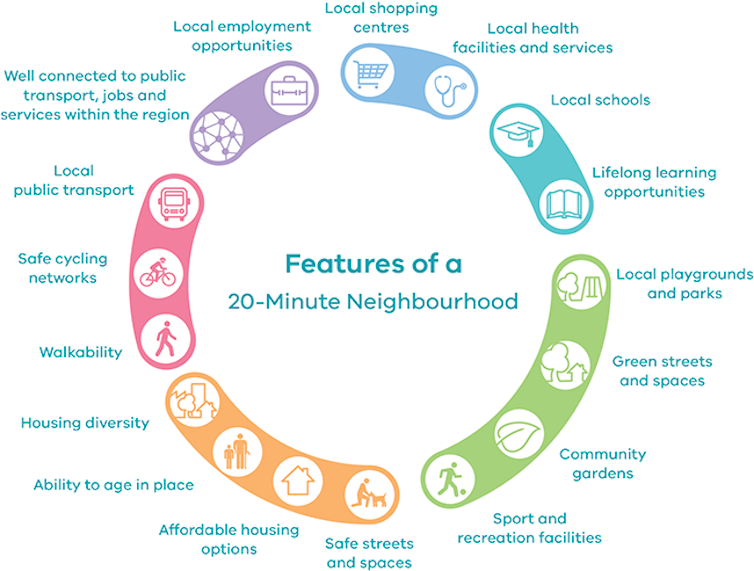
Key takeaways
The 20-minute neighbourhood concept is growing in relevance, with a focus on lifestyle convenience and accessibility to daily needs.
Work-from-home trends and hybrid working have intensified the demand for living in communities that provide easy access to amenities.
Suburbs with local facilities are seeing greater property demand, as people value proximity to cafes, parks, shops, and workspaces.
Health, well-being, and social connections are key drivers for choosing 20-minute neighbourhoods.
The trend reflects a shift towards a more localised lifestyle, changing the way Australians view urban living.
In this article I list the 7 key criteria for a great neighbourhood.
2024 has seen many property markets property market around Australia grow strongly, and affordability ( or lack thereof) continues to be a major factor influencing fragmented capital growth across different locations.
As the year progresses, flexible work arrangements remain a norm, and hybrid work situations are deeply embedded in our lifestyles.
This means gone are the days where our ‘home’ was simply the place we rest our heads and enjoy some downtime between work and our social lives - the lessons we learned from coronavirus social distancing have put an end to life as we once knew it.
In my mind, the ability to work, live and play all within 20 minutes reach is the new gold standard desirable lifestyle.
One thing I know many of those living in Melbourne learned during our 260 days of lockdown was the importance of their “third place”
If our first place is home and our second place is work or the office, it has been the ability to go to a third place that was taken away from many of us during the lockdowns.
It may have been a favourite café, a gym or a place of worship and even local shops and pubs.
They missed that feeling and connection to others, having an outlet to take a break from family or colleagues for a short period to reset.
A gym or exercise centre has been substituted for a favourite walking or cycling path with green space and fresh air.
So, all these features combined will be a major requirement and will create huge demand moving forward.

Note: These are all features of the 20-minute neighbourhood, that will be built around convenience.
Imagine being able to carry out your daily activities within a 20-minute walk from home.
 All the things you need in a day would be just a short walk away.
All the things you need in a day would be just a short walk away.
In urban planning circles, it’s a concept known as the 20-minute neighbourhood, and it could be on the cards for your area sooner than you think.
It seems that people love the thought that most of the things needed for a good life are within a 20-minute public transport trip, bike ride or walk from home.
Things such as shopping, business services, education, community facilities, recreational and sporting resources, and some jobs.
But this is nothing new...the rise of the 20-minute neighbourhood started long before COVID-19.
The concept arose from people’s desire to return to living locally and urban planners’ recognition that these neighbourhoods offer high levels of liveability, says UNSW Built Environment Professor Linda Corkery.
“The goal of the 20-minute neighbourhood is to make available the essentials of day-to-day life within a convenient walk from home,” she says.
“This means having shops and services, schools, public transport, and employment within a 20-minute walk.
“So considering a typical day, I might need to get my kids to school, collect a script at the chemist, meet a friend for coffee, pick up groceries, and ideally that could all be done on foot.
“The 20-minute distance stems from what is considered an average walking time for a healthy adult to cover roughly 800m,” she says, “taking into account the general ‘walkability’ of the area.”
Creating a city of 20-minute neighbourhoods is a key policy direction of Plan Melbourne 2017-2050.
The benefits of living local

State Government of Victoria, CC BY
Professor Corkery says the 20-minute neighbourhood offers a range of benefits beyond convenience.
One of the fundamental principles underpinning the idea is to promote walkable neighbourhoods that will get people moving and can, in turn, deliver healthier lifestyles and improved public health, generally.“Residents of these neighbourhoods often have a strong sense of community and connection to place,” she says.
“People are out and about on the street socialising, supporting local businesses, being involved with local schools, enjoying local parks. It helps all those kinds of things.”
“There are also environmental benefits to be gained if people aren’t jumping in their cars all the time to do local errands.”
Professor Corkery says living under COVID-19 restrictions for the past several months has emphasised the benefits of the 20-minute neighbourhood.
“It’s come sharply into focus because we’ve had to stay at home and only go outside for ‘essential’ activities’” she says.
“People are re-discovering their local areas, and we’re seeing increased use of local parks and streets for daily exercise.
“And, we’re taking more notice of the amenity, or lack of, in local neighbourhood environments.
In some places we can see the need to have a better street design, improved footpaths, street trees, and connections to local green spaces,” she says.
“We’re also realising that we may not need to travel into [work] every day,” she says.
“We’re learning how to engage students with their learning when we’re all operating from different locations. In fact, we’re saving a lot of time by not commuting and valuing more the benefits of our local communities.”
Becoming a 20-minute neighbourhood
Many inner suburbs of Australia’s capital cities and parts of their middle suburbs already meet a 20-minute neighbourhood test.
However, very few of the outer suburbs would do so.
It’s about more than walkability. For outer suburbs to become 20-minute neighbourhoods, then two key requirements must be met.
- Local development densities need to be increased, to say around 25-30 dwellings per hectare, which will better support local activity and services provision.
An introduction of a mix of uses into these neighbourhoods. This would bring more jobs and services close to where people live. They would also have a range of housing to support a mix of household types, income levels and age groups.
This combination is often known as density plus diversity. - Second, local public transport service levels need to be greatly improved.
Professor Corkery says 20-minute neighbourhoods won’t happen overnight.
Planning for them involves a detailed analysis of existing facilities, businesses and services, local open spaces and activity patterns.
 “Residents need to communicate their fine-grain knowledge and appreciation of local neighbourhood features to their local council to assist this planning.”
“Residents need to communicate their fine-grain knowledge and appreciation of local neighbourhood features to their local council to assist this planning.”
“As landscape architects, we focus on the quality of the public realm, for example, to make sure there are safe and accessible footpaths that connect you to attractive and comfortable public spaces,” she says.
“Beyond the neighbourhood, those connections can get you to a bus stop or train station that connects you to your employment.”
In Australia, the City of Melbourne has led the charge in using the 20-minute concept to shape their future city around a series of such neighbourhoods.
Professor Corkery notes that in Sydney, many of the older, close-in suburbs are already 20-minute neighbourhoods which makes them popular locations.
“Of course, popularity boosts property values and then living locally becomes unaffordable,” she says.
“We need to make that housing options available that will make it possible for families and young professionals to live in these neighbourhoods – and at the other end of the spectrum enable older people to age in place.”
Ultimately, achieving a 20-minute neighbourhood will require the integrated efforts of many disciplines but has the potential to deliver vital, productive, and sustainable urban communities, she adds.
What does all this mean for property investors?
We know that location will do 80% of the heavy lifting in your property’s performance and that some locations outperform others by 50% to 100% over a decade with regard to capital growth.

How do we identify these locations?
What makes some locations more desirable than others?
A lot has to do with the demographics – locations that are gentrifying and also locations that are lifestyle locations and destination locations that aspirational and affluent people want to live in will outperform.

Note: It's well known that the rich do not like to travel and they are prepared to and can afford to pay for the privilege of living in lifestyle suburbs and locations with a high walk score– meaning they have easy access to everything they need.
So lifestyle and destination suburbs where there is a wide range of amenities within a 20-minute walk or drive are likely to outperform in the future.
At the same time, many of these suburbs will be undergoing gentrification - these will be suburbs where incomes are growing, which therefore increase people’s ability to afford, and pay higher prices, for the property.
The key criteria for a ‘great’ neighbourhood
Neighbourhood has always been a key factor to consider when buying an investment property, and now it’s even more important.
Here is a list of 7 primary neighbourhood factors that have the potential to drive up property prices:
1. Close proximity to public transport

Neighbourhoods with properties that are within walking distance of public transport, such as the train, bus, ferry or light rail, are popular with buyers and therefore are likely to add value over the longer term.
2. Close proximity to schools
Some buyers will pay a premium to be in the catchment area for particular schools and as such, high demand generally means higher property price points.
3. Accessible amenities
As we have previously discussed, a neighbourhood with all the local amenities you could want - parks, shops, restaurants, cafes, gyms, the beach etc. - would fetch a premium price for its local properties.
4. A low crime rate
It goes without saying that a property in a neighbourhood with a low crime rate will be more valuable than one with a high crime rate.
5. It’s well maintained
Neighbourhoods and homes which are well-maintained and clean indicate a level of community care that can help add value to properties in the local area.
6. Planned upgrades which are beneficial
Neighbourhoods with planned upgrades could be beneficial or detrimental to property prices in the area.
For example, improved public transport and any plans to make the neighbourhood more visually attractive (improvement to the appearance of buildings or footpaths for example) could increase property prices.
7. Any historic charm
Historic charm brings unique character to a neighbourhood that is often in demand by buyers and in the long term buyer demand for this type of area has the potential to translate to higher property prices going forward.














